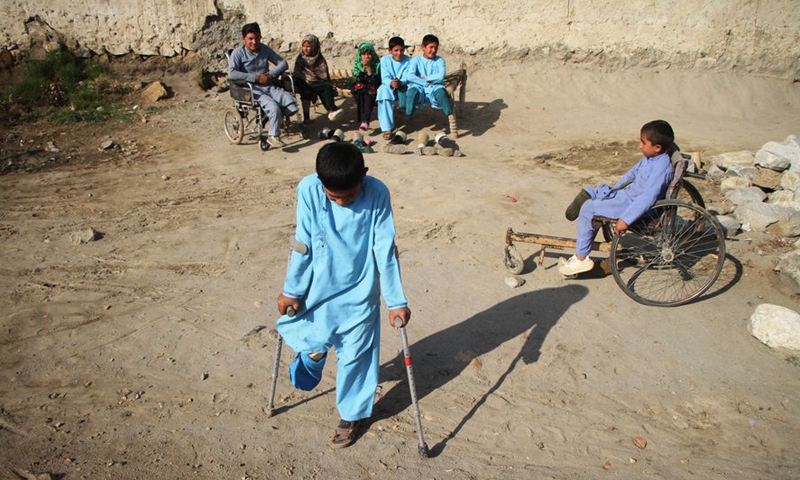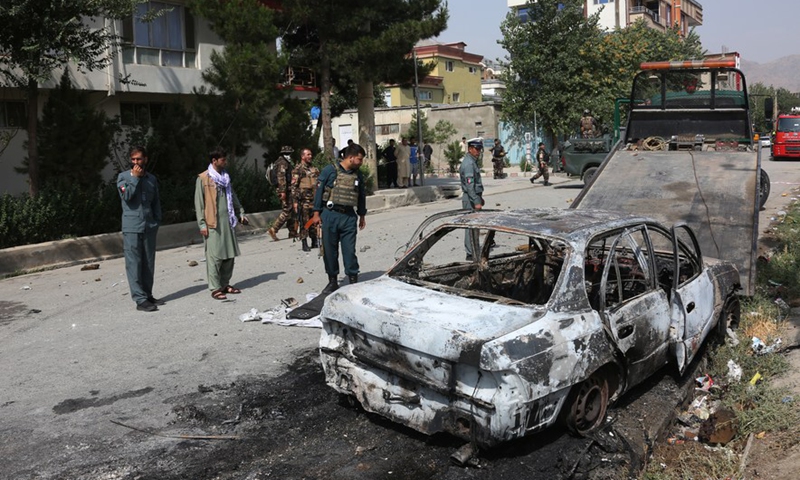
Photo taken on Feb 22, 2020 shows disabled children in Surkh Rod district of Nangarhar province, eastern Afghanistan. The UN Assistance Mission in Afghanistan (UNAMA) has documented more than 10,000 civilian casualties in 2019, of these more than 3,400 had been killed, said a report of the body released. Photo:Xinhua
Chinese and foreign experts and diplomats criticized the US for severely violating human rights in Afghanistan, including killing thousands of Afghan civilians, causing a flood of refugees and leaving messy situations for regional countries and the international community. Some of them expressed support for Afghan people to hold the US accountable for committing crimes against humanity and war crimes at an international seminar on Saturday.
The international seminar themed "Human Rights Violations Caused by US Military Intervention of Afghanistan" was a sideline event for the 48th session of the United Nations Human Rights Council. It was jointly held by the China Society for Human Rights Studies, China's Permanent Mission to Geneva and the Human Rights Institution of Southwest University of Political Science and Law in Chongqing.
Together with scholars from China, guests from France, Nepal, Pakistan, the Netherlands, Japan and representatives from Iran's and Venezuela's permanent missions to Geneva attended the seminar by video link.
The wanton killing of civilians in Afghanistan, capturing and torturing of Afghan people, indulging in terrorism, making stagnant economic and social development in the country, causing a flood of refugees… these are the notorious US violations of human rights mentioned by experts at the seminar.
The US' hypocrisy on human rights is also a topic at the Saturday seminar.
Mahdi Aliabadi, Deputy Permanent Representative of the Islamic Republic of Iran in Geneva, said that the US and its alliances have been indifferent to violations of human rights during their military occupation of Afghanistan and the international community should stand out to support victims to hold predators accountable.
Aliabadi noted that the trouble caused by the US in Afghanistan is the latest example to showcase their hypocrisy when talking about human rights since human rights have become tools for them to play geopolitics. This is the "darkest page" that the international community is watching and will leave in people's minds forever.
Qian Feng, director of the research department at the National Strategy Institute at Tsinghua University, believes that the withdrawal of US troops from Afghanistan has not only traumatized the Afghan people, but has also brought unforgivable crimes to the people of the world.

Security force members inspect a damaged vehicle from which rockets were fired in Kabul, Afghanistan, July 20, 2021.Photo:Xinhua
The US has committed two crimes in Afghanistan - crimes against humanity and war crimes, Qian said, noting that the US has conducted the wanton killing of civilians in the name of counter-terrorism. For example, the US military launched an air raid on Herat Province in August 2021, killing more than 100 people.
Qian noted that years of war started by the US have not only killed children in Afghanistan but also caused severe malnutrition with nearly half of local children suffering from it.
"Justice is late, but it will not be absent. The international community should support Afghanistan in its pursuit of punishing US military crimes," Qian said.
Aside from killing Afghan civilians, punishing, torturing and abusing captured Afghan people, the US is also accused of insulting their religion. Moreover, the 20-year-long war struck a heavy blow to Afghanistan's economy and since 2001, the country's economic and social development has stagnated, said Wang Nan, an academic consultant for the Institute of Silk Road Strategy Studies.
In the fiscal year 2019-2020, the urbanization rate in Afghanistan was only 26%, the unemployment rate exceeded 40%, and the poverty rate exceeded 70%. Moreover, the average life expectancy of Afghans is about 45 years.
Mei Xinyu, a research fellow at the Chinese Academy of International Trade and Economic Cooperation of China's Ministry of Commerce, pointed out that whether there will be a serious food shortage and humanitarian crisis in Afghanistan deserve the attention of the international community.
Global food prices have soared for two consecutive years, which was not only caused by natural disasters but also by man-made disasters. The US relaxation of fiscal and monetary policies have led to rising commodity prices. In fiscal years 2019 and 2020, the per capita grain output in Afghanistan was only over 170 kg, which cannot guarantee the people's basic survival needs, Mei noted.
"Whether a food crisis will break out in Afghanistan is a big question. We can see that the US often boasts that it dominates the world order, but from what it has done, can it really promote the development of human rights in the world? It is a problem," said Mei.
Some foreign experts at the seminar also talked about the consequence of the US' hasty withdrawal from Afghanistan.
Christian Mestre, a professor from the Human Rights Institute of University of Strasbourg, said that the US military's actions in the country were a failure and the military occupation was not only the US' political hegemony but also the hegemony of the West.
Mestre noted that European countries are also infuriated by the Biden administration's incompetence of dealing with the situation in Afghanistan and the messy result. With the signing of the security pact AUKUS among the US, UK and Australia, which is like adding oil to the fire, the EU may reconsider its own security issues and may make its own decisions without living under the shadow of the US.





